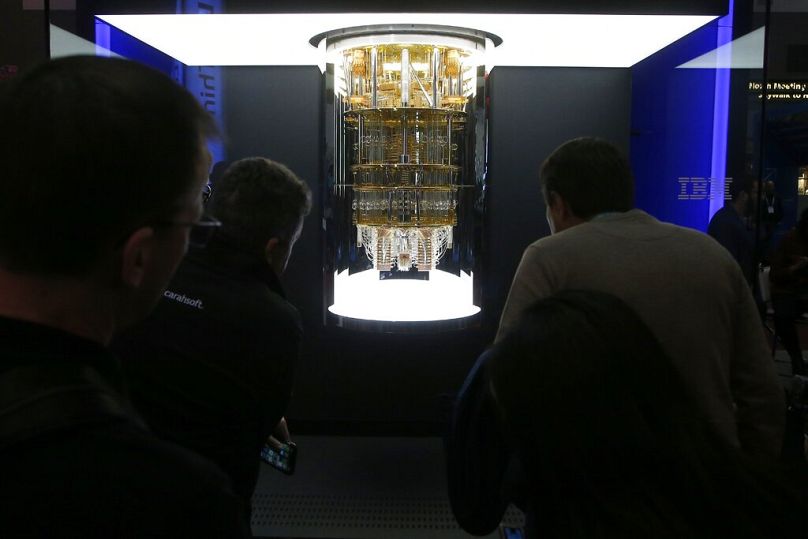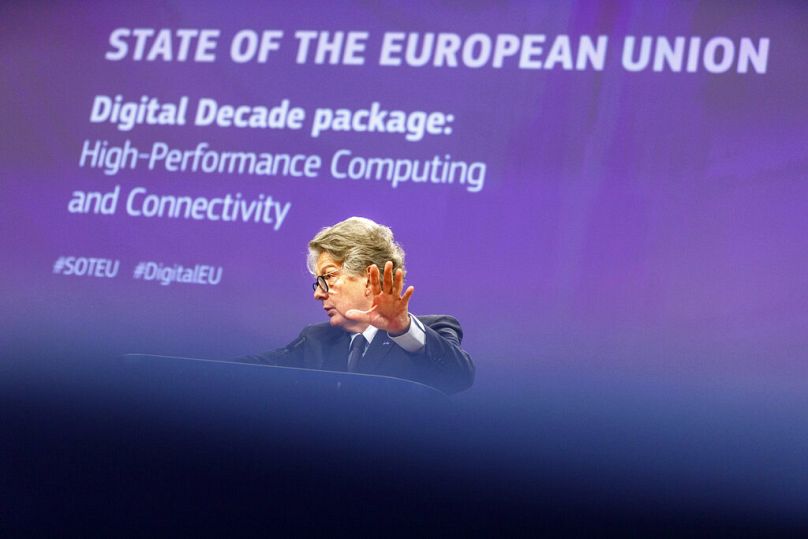Quantum computing's physics-oriented behaviour allows it to be infinitely scalable, which is why Europe has to master this mysterious tech if it wants to avoid a brewing dystopia, Koen Bertels writes.
Europe has become known as a second-place destination for business, and more recently, innovation.
 ADVERTISEMENT
ADVERTISEMENT
 ADVERTISEMENT
ADVERTISEMENT
Disruptive technologies like AI have hailed from the United States for decades with no European challenger in sight.
However, when a four-week-old French AI startup secured €105 million for its seed round, it demonstrated that Europe isn’t as disadvantaged as people think. While AI is a saturated market, quantum computing can allow Europe to survive in a century ruled by China and the US.
Quantum computing will be the foundation for developing AI that can have the ability to solve real-world problems. That is why Europe must aggressively discover more user applications and increase quantum talent before its competition does.
Solving problems normal computers can't
The European Union is known for many things, but business isn’t its speciality, especially in comparison to the US.
In addition to having a massive population and landmass, the United States has defined innovation for decades. Whether we’re speaking about Silicon Valley, Wall Street, or Hollywood, America has achieved rapid growth and quality before many others.
According to IBM, quantum computing is a "rapidly emerging technology that harnesses the laws of quantum mechanics to solve problems too complex for classical computers."
Quantum computing is meant to solve the problems that normal computers can’t. These machines offer more power, speed, and accuracy by storing and processing information in multiple states.
This means one-dimensional binary digits (the 1’s and 0’s) can be run simultaneously in a quantum computer. But the sensitivity of qubits has kept the tech from fully advancing.
It's the tech race Europe can't afford to lose
In 2022 alone, quantum technology received $2.35 billion (€2.15bn) in investment, since it is crucial for our technology to become smaller, faster, and more powerful.
Although the funding is quite similar between the US and the EU, the Boston Consulting Group has highlighted the weaknesses Europe must fix in order to beat other nations in the quantum race.
According to the firm’s report, this is "The Tech Race Europe Can’t Afford To Lose", but they’re already falling behind as the EU lacks coordination, adequate private funding, and strategies for maximizing talent from the earliest educational points.
The report references Europe’s failure to reap rewards from the semiconductor industry as evidence that the region will lose again if they don’t take a different approach. The group predicts that quantum will create $450-850bn (€412.5-780bn) in value in the next 15 to 30 years.
In addition to being behind in funding, talent, and strategy, Europe isn’t only competing against the US. China has contributed the largest investment to the industry thus far. The government has claimed to put $15bn (1€3.75bn) towards quantum research, with the biggest emphasis on quantum computing and software.
This is creating a new AI race solely focused on creating solutions that our tech is running out of options for.
Our future and our security depends on it — and it's already here
Quantum computing isn’t the future of our tech world. It’s the present. Our most advanced devices use silicon computer chips that have billions of transistors on them and are nanometers in size.
These tiny semiconductors are responsible for controlling voltage and switch gates, but they’re almost incapable of shrinking.
The industry won’t be able to make smaller, more efficient chips because they will begin behaving like quantum creations, which will require computing to explore this sector.
Although we won’t have quantum computers on the market for a long time, Europe needs to research what we can use them for and teach people that they should join the industry because our security depends on it.
Quantum computing will empower governments, companies, and any other owner of this advanced tech to defeat the most complex military, intelligence, and biosecurity threats.
These ultra-fast computers will be able to process vast amounts of satellite data, develop vaccines for viral mutations, simulate nuclear weapon attacks to formulate defence strategies, and even surpass the encryption of highly classified government documents.
Infinitely scalable tech has sparked a race between adversaries
If Europe doesn’t obtain more talent, funding, and researchers to discover the power of quantum computing, someone else will.
Quantum computing can find the most precise answer from billions of data points because of its non-deterministic thinking. Its physics-oriented behaviour allows it to be infinitely scalable, which is why Europe has to master this mysterious tech if it wants to avoid a brewing dystopia.
US and Chinese companies are already racing to develop this tech better than their adversaries.
IBM and Google recently gave $100m and 50m (€91.6m and 45.8m) respectively to US and Japanese universities to research quantum since China is working to advance its own programs.
Jiuzhang, China’s newest quantum computer, is 180 million times faster on AI tasks and is capable of solving problems in a second that would take a supercomputer hundreds of years to solve.
Meanwhile, Europe is struggling to leverage its public investments to counteract Beijing and Washington DC.
To be a respected world power, Europe needs a clearer strategy for utilising private funding, attracting global talent, and finding breakthroughs.
If they fail, the region’s national security will be compromised by this world-destroying tech.
Dr Koen Bertels is an internationally acclaimed professor currently teaching quantum engineering at the University of Ghent. He is the founder of QBee, a full-stack quantum computing accelerator.
At Euronews, we believe all views matter. Contact us at view@euronews.com to send pitches or submissions and be part of the conversation.




















